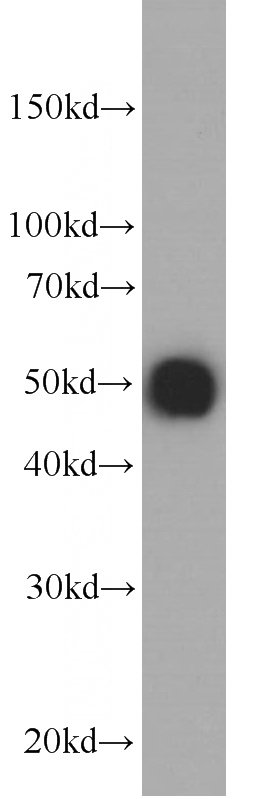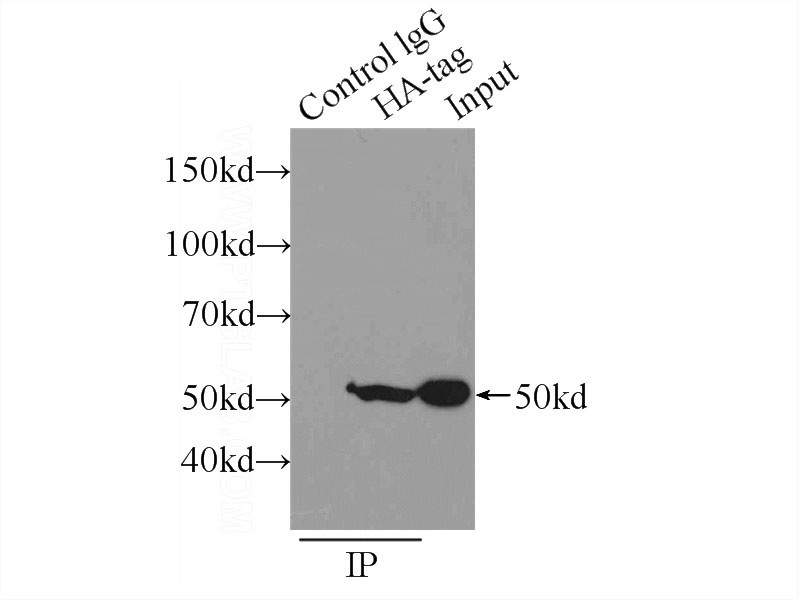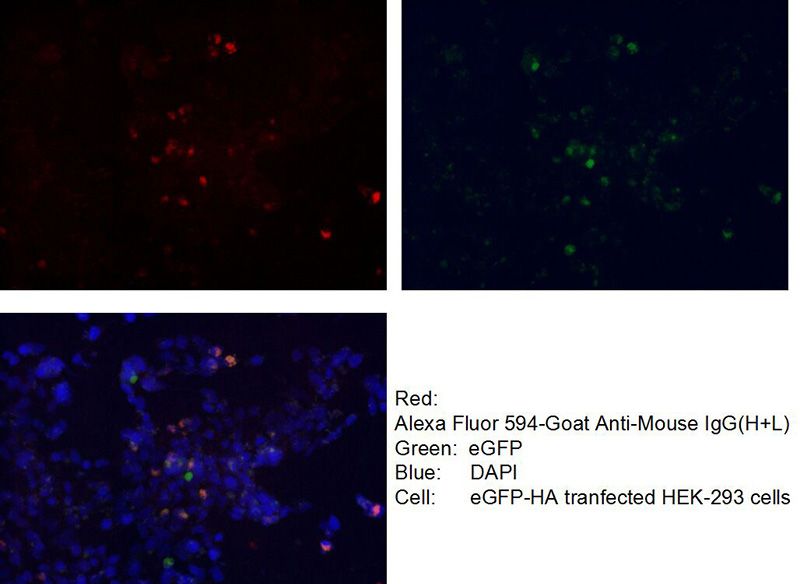-
Product Name
HA-Tag antibody
- Documents
-
Description
HA-Tag Mouse Monoclonal antibody. Positive IF detected in Transfected HEK-293 cells. Positive IP detected in Transfected HEK-293 cells. Positive WB detected in Recombinant protein.
-
Tested applications
ELISA, IP, WB, IF
-
Species reactivity
Tag
-
Alternative names
HA Tag antibody; YPYDVPDYA antibody
-
Isotype
Mouse IgG1
-
Preparation
This antibody was obtained by immunization of Peptide (Accession Number: HA). Purification method: Protein A purified.
-
Clonality
Monoclonal
-
Formulation
PBS with 0.02% sodium azide and 50% glycerol pH 7.3.
-
Storage instructions
Store at -20℃. DO NOT ALIQUOT
-
Applications
Recommended Dilution:
WB: 1:5000-1:50000
IP: 1:2000-1:20000
IF: 1:10-1:100
-
Validations

Recombinant protein were subjected to SDS PAGE followed by western blot with Catalog No:117325(HA-tag Antibody) at dilution of 1:20000

IP Result of anti-HA-tag (IP:Catalog No:117325, 5ug; Detection:Catalog No:117325 1:5000) with Transfected HEK-293 cells lysate 400ug.

Immunofluorescent analysis of Transfected HEK-293 cells using Catalog No:117325(HA-tag Antibody) at dilution of 1:50 and Alexa Fluor 488-congugated AffiniPure Goat Anti-Mouse IgG(H+L)
-
Background
Protein tags are protein or peptide sequences located either on the C- or N- terminal of the target protein, which facilitates one or several of the following characteristics: solubility, detection, purification, localization and expression. The HA tag is corresponds to amino acid residues YPYDVPDYA of human influenza virus hemagglutinin(HA). Many recombinant proteins have been engineered to express the HA tag, which does not appear to interfere with the bioactivity or the biodistribution of the recombinant protein. This tag facilitates the detection, isolation, and purification of the proteins. The HA tag is useful in western blotting and immunohistochemical localization of expressed fusion proteins when examined with antibodies raised specifically against the HA-tag.
-
References
- Lu B, Sun X, Chen Y. Novel function of PITH domain-containing 1 as an activator of internal ribosomal entry site to enhance RUNX1 expression and promote megakaryocyte differentiation. Cellular and molecular life sciences : CMLS. 72(4):821-32. 2015.
- Zhao N, Gong P, Cheng B. Eimeria tenella: 14-3-3 protein interacts with telomerase. Parasitology research. 113(10):3885-9. 2014.
- Xiong W, Yang J, Wang M. Vinexin β Interacts with Hepatitis C Virus NS5A, Modulating Its Hyperphosphorylation To Regulate Viral Propagation. Journal of virology. 89(14):7385-400. 2015.
- Tsai YC, Lapina MC, Bhushan S, Mueller-Cajar O. Identification and characterization of multiple rubisco activases in chemoautotrophic bacteria. Nature communications. 6:8883. 2015.
Related Products / Services
Please note: All products are "FOR RESEARCH USE ONLY AND ARE NOT INTENDED FOR DIAGNOSTIC OR THERAPEUTIC USE"
